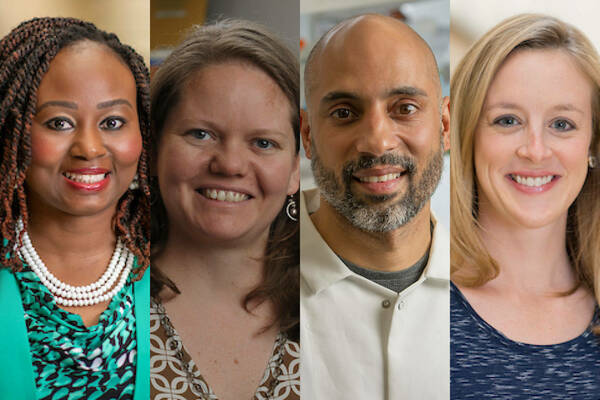

Four faculty members from the University of Notre Dame have received awards from the Indiana Clinical and Translational Sciences Institute’s (CTSI) Reciprocal Innovation Grants Program. This Indiana CTSI grant program supports the researchers and their international partners to tackle global health concerns that are also issues for Hoosiers.
The Reciprocal Innovation Grants Program offers two types of grants. The demonstration grant supports high impact solutions that provide reciprocal benefit to Indiana and low- to middle-income country partners and the planning grant supports planning and training activities that will lead to applications for various projects.
Notre Dame’s grant recipients are:
Yenupini Joyce Adams, visiting assistant professor of global health at Notre Dame, received the demonstration grant for her research titled, “Focused-PPC: An integrated postpartum care, education, and support model for women in Ghana.”
Neil Lobo, research professor of biological sciences at Notre Dame, was awarded a planning grant for his project, “Validation of a scalable and automated mosquito species identification system.”
Laura Miller-Graff, associate professor of psychology and peace studies at Notre Dame, and external partners Kathryn Howell and Cecilia Martínez-Torteya received a planning grant for “Addressing the global health burden of intimate partner violence: Establishing partnerships for the Pregnant Moms’ Empowerment Program in Mexico.”
Vania Smith-Oka, associate professor of anthropology at Notre Dame, was awarded a planning grant for her research, “Investigating indications for cesareans: Employing the Robson Classification to address maternal health in Indiana and Mexico.”
Each awardee is affiliated with the Eck Institute for Global Health (EIGH), which builds on the University’s historical strength in infectious disease research while broadening the scope into areas of expertise like epidemiology, maternal and community health, biochemistry, and more.
“The Indiana CTSI grant program provides important funding for research to bridge the perceived gaps between local and global health issues. This support for research into maternal health and vector-borne diseases is further recognition of how our human interconnectedness provides an opportunity to better address health issues to benefit us all, wherever we might live,” Dr. Bernard Nahlen, director of the EIGH and professor of biological sciences at Notre Dame.
The EIGH is providing supporting funds for each Indiana CTSI Reciprocal Innovation Grant awardee. To learn more about the EIGH, please visit globalhealth.nd.edu.
The Indiana CTSI is a statewide collaboration of Indiana University, Purdue University, and the University of Notre Dame, as well as public and private partnerships. Established in 2008, the Indiana CTSI is supported by a $25 million Clinical and Translational Science Award from the National Center for Advancing Translational Sciences of the National Institutions of Health, supplemented by nearly $60 million from the state, the three member universities, and public and private partnerships. The Indiana CTSI is a member of a national network of CTSA-funded organizations across the U.S.
Contact:
Brandi Wampler / Research Communications Specialist
Notre Dame Research / University of Notre Dame
brandiwampler@nd.edu / +1.574.631.8183
research.nd.edu / @UNDResearch
About Notre Dame Research:
The University of Notre Dame is a private research and teaching university inspired by its Catholic mission. Located in South Bend, Indiana, its researchers are advancing human understanding through research, scholarship, education, and creative endeavor in order to be a repository for knowledge and a powerful means for doing good in the world. For more information, please see research.nd.edu or @UNDResearch.
Originally published by at globalhealth.nd.edu on October 06, 2021.